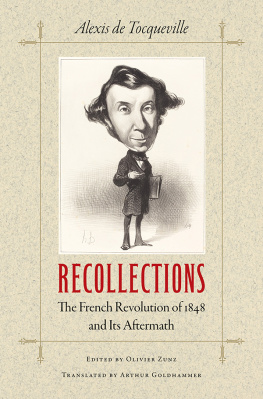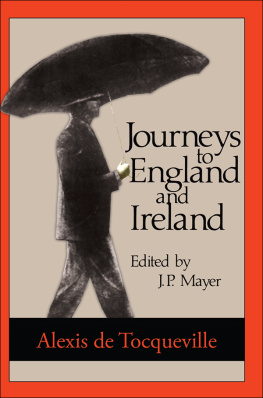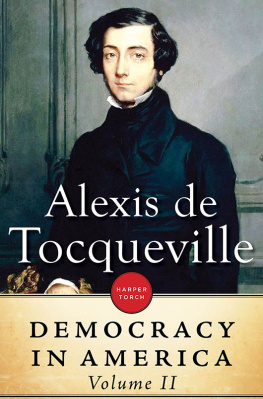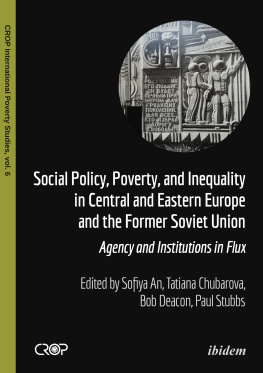MEMOIRS ON
PAUPERISM
AND OTHER WRITINGS
Poverty, Public Welfare, and Inequality
ALEXIS DE TOCQUEVILLE
Edited and translated by
CHRISTINE DUNN HENDERSON
University of Notre Dame Press
Notre Dame, Indiana
University of Notre Dame Press
Notre Dame, Indiana 46556
Copyright 2021 by University of Notre Dame
All Rights Reserved
Published in the United States of America
Library of Congress Control Number: 2020950374
ISBN: 978-0-268-10904-2 (Hardback)
ISBN: 978-0-268-10905-9 (Paperback)
ISBN: 978-0-268-10907-3 (WebPDF)
ISBN: 978-0-268-10906-6 (Epub)
This e-Book was converted from the original source file by a third-party vendor. Readers who notice any formatting, textual, or readability issues are encouraged to contact the publisher at
CONTENTS
ACKNOWLEDGMENTS
Many people contributedeither directly or indirectlyto the creation of this volume, and I am indebted to them all. Lenore Thomas Ealy first suggested that someone should translate the Second Memoir on Pauperism, and both the introduction and the Second Memoir benefited from her deft editing and keen ear for language. Other early encouragement for working on the memoirs came from the late John Blundell and from Steve Wrinn at University of Notre Dame Press. I am also grateful for the feedback from the several groups with whom I have shared discussions of the memoirs over the years: attendees at a 2013 dinner colloquy entitled The End of Social Justice sponsored by The Philanthropic Enterprise; students and faculty at Furman University in 2014, and a group brought together by the Bastiat Society in Indianapolis that same year; my former colleagues at Liberty Fund; and the participants in a 2019 colloquium sponsored by the Mercatus Center (with the support of the John Templeton Foundation).
Hank Clark, Enrico Colombatto, and Catherine Labio read drafts of the various translations and offered many suggestions for improvement. I am indebted to them for generously sharing their time and expertise and for saving me from countless blunders. I am similarly indebted to the anonymous readers at University of Notre Dame Press for their close readings of this book and for their many helpful suggestions about the introduction and the translation itself. Despite the heroic efforts of all of these people, I am sure some translation errors remain; responsibility for these lies entirely with me. Finally, Chandran Kukathas read every word of this book, offering support, insightful comments, and bad puns along the way. James Henderson provided equally strong moral support and slightly better puns. Both of these proto-Tocquevillians have enriched my life beyond words; I dedicate this volume to them.
A NOTE ON THE TEXTS
These translations are based on the French editions of Tocquevilles texts as found in the multivolume Oeuvres Compltes (OC) published by Gallimard, under the direction of Franois Mlonio. Both Mmoires and the Lettre sur le pauprisme en Normandie are found in Mlanges (OC, vol. 16), while Pauprisme en Amrique is an appendix to Du systme pnitentiaire aux tats-Unis, et de son application en France and is found in the OC, volume 4. As noted, all references to Democracy in America are from the historical-critical edition of Democracy in America, edited by Eduardo Nolla, translated by James T. Schleifer, and published by Liberty Fund (2010).
Notes that are original to Tocqueville are indicated with superscript letters and appear at the bottom of the page; editorial notes are indicated with superscript numerals and appear at the back of the book. Unless otherwise noted, all italics in the text reflect italics in the French sources.
INTRODUCTION
Christine Dunn Henderson
Alexis de Tocqueville (180559) is best remembered in the United States for Democracy in America, his penetrating study of life in the early nineteenth century. Tocqueville was, of course, an analyst of his own France, and his The Old Regime and the Revolution remains a classic analysis of prerevolutionary and revolutionary France. Less well known, however, is that Tocqueville was also keenly interested in England, traveling there several times and following with great attention the political and social developments there during his lifetime. One outgrowth of his interest in Englands politics was his Memoir on Pauperism, a brief but powerful piece written following an 1833 visit to England and delivered to the Royal Academic Society of Cherbourg in 1835. This memoir, which was not included in the early editions of Tocquevilles collected works and which was not even translated into English until 1968, captures England at a very specific moment, as her Elizabethan-era poor laws were undergoing major revision, via the Poor Law Amendment Act of 1834.
In the Memoir, Tocqueville explores the unanticipated evils arising from public assistance programs; via this investigation, we can glimpse some of Tocquevilles influences, as well as the distinctiveness of his analysis of democracyan analysis that remains constant across his thought and that connects the Memoir to his other works. In terms of influences, his exploration of how public charity causes the ranks of paupers to swell is shaped by the work of J.-B. Say, and the account of mans movement from the state of nature to civil society is clearly indebted to Rousseau. In terms of continuities with Tocquevilles other works, the Memoir s discussions of the links between poverty and crime recall similar themes explored in Pauperism in America, an appendix to the 1833 Penitentiary Report (coauthored with Gustave de Beaumont), which had provided the original excuse (as Tocqueville described it) for the trip to the United States that eventually spurred the writing of Democracy in America. Echoes of some of Democracy in Americas central elements can also be found in the Memoir, particularly in the importance ascribed to voluntary associations in a free society, in Tocquevilles preference for local action, and even in the elements of democratic psychology at play in the statement of the problem as well as in potential solutions.
The Memoir ends with the promise of a sequel, in which Tocqueville would outline solutions to the discrepancies between the intentions and outcomes of policy he observed in England. Although he partially drafted a Second Memoir on Pauperism, that work remained unfinished, the problem of crafting an improved remedy unsolved. This volume brings the two memoirs together for the first time in English, along with a letter fragment considering pauperism in Normandy, and the Pauperism in America appendix to the Penitentiary Report. When read in combination, the Memoir, its unfinished sequel, and the other pieces invite exploration of several themes, including the challenge of poverty in modern society, the possibilities and difficulties associated with various attempts to find solutions, and the manner in which democratic societythe inevitable future in Tocquevilles view, as well as the operative idea behind his thinkingaffects both the issue of poverty and various solutions to it. This introduction focuses primarily on the two memoirs, exploring the problems of modern poverty as well as the various solutions Tocqueville ponders, particularly considering them in the context of the themes developed more fully in Democracy in America.
SOME BACKGROUND
Before we turn to the memoirs themselves, a brief overview of the status of poor relief in England and Wales is necessary. Until the mid-sixteenth century, aid to the poor had generally been administered by the church, on a parish-based level. When Henry VIII began expropriating Englands monasteries in 1536, however, two effects were soon felt that caused assistance to the poor to move out of the hands of the church and into the hands of the state: on the one hand, the church had fewer resources to allocate to its poor-relief efforts, and on the other hand, the states coffers expanded. The state thus began to fill the vacuum left by the expropriated monasteries and to provide relief and assistance to the poor. This activity was codified in a series of laws enacted during the reign of Elizabeth I, the best known of which was the Poor Law Relief Act of 1601, also known as the Elizabethan Poor Law.









